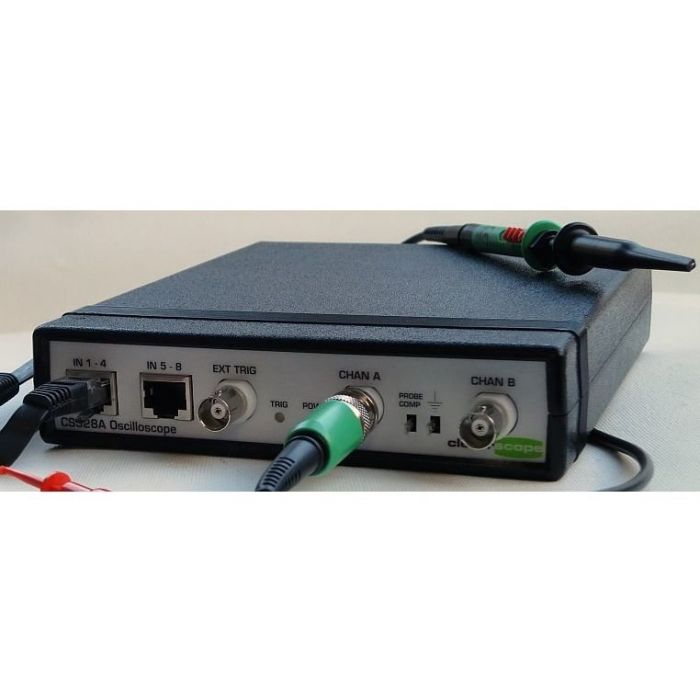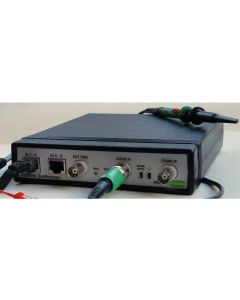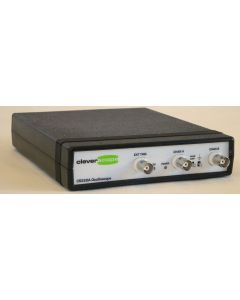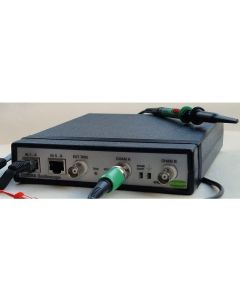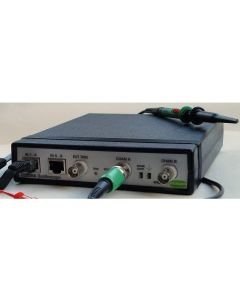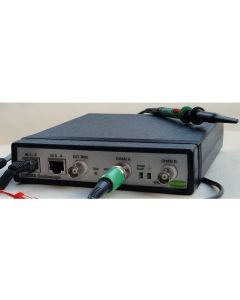
CS328A
CS328A
Cleverscope
USB 2.0 oscilloscope
12 bit, 100 MSa/s, 2 analog channels, 8 digital inputs, External Trigger, 8M samples storage for each of the 2 analog and 8 digital channels, comes with the CS300 application software, 2 x CS1001 and CS1004/5 probe sets. The front panel ground is continuous via the USB ground to the PC.
Cleverscope Model CS328A is a USB connected, PC hosted oscilloscope and spectrum analyser with PC based application software.
Cleverscope Model CS328A is a USB connected, PC hosted oscilloscope and spectrum analyser with PC based application software.
Contact us for Lead Time
Click below to request a quote for this item. Or for product advice, stock and lead time enquiries call our team on 0330 313 3220.
| Attribute | Value |
|---|---|
| Relative Humidity | 0°C to +40°C <90% relative humidity >40°C <60% relative humidity |
| Altitude | Operating 3,000 m Non-operating 15,000m |
| AWG | 4096 samples maximum at 167.772 MHz sampling rate The sample rate may be reduced in steps of 6ns. Continuous at 50 ksps |
| Frequency Range | Sine, Square: 0.2 Hz – 10 MHz Triangle: 0.2 – 1 MHz |
| Protection | Short Circuit Protected ± 10V peak overdrive < 1 min |
| Phase Noise | 1kHz offset, -150 dBc/Hz |
| Amplitude Accuracy | ± 2% |
| Resolution | 0.02 mV for 20 mV Full Scale. |
| Analog Bandwidth | 100 MHz, -3dB |
| Sample Rate | 100 MSa/sec |
| Isolation Capacitance | 7.3 pF (Output BNC shell to Cleverscope Ground) |
| Output Frequency Range | 1 kHz |
| Output Impedance | 50 ohm |
| DAC Resolution | 14 bit |
| Power Consumption - Power Supply | 6W |
| Cooling Method | Convection |
| Input Voltage Range | -16 to + 20V |
| Acquisition Unit |
|
| CS300 Application Software |
|
| Equipment List |
|
| Acquisition Outputs | Waveforms: Sampled, Peak Detected, Filtered, Averaged in PC, Averaged in Acquisition Unit, and Spectrum |
| Acquisition Modes | Single Shot, Triggered, Automatic, Repetitive (High Frequency), Multiple Frame |
| Acquisition Rate to PC - Via USB | 20 Frames per second |
| Acquisition Rate - Multiple Frame | Continuous capture until buffer is full (2 - 3000 frames of 4M - 1300 samples) |
| Filtering | Moving average filter with 40n – 1.28us time constant. Resolution improvement to 12 or 14 bits. 20 MHz anti-alias filter. |
| Number of Analog Inputs | 2 |
| Input Coupling | DC, AC, GND |
| Input Impedance - DC Coupled - All Channels | 1 MΩ ±2% in parallel with 20 pF ±3 pF |
| Maximum Voltage Between Signal and Common at Input - BNC |
300 Vrms (420V peak, duty cycle <50%, pulse width
<100 msec) For steady state sinusoidal waveforms, derate at 20 dB/decade above 100 kHz to 10 Vpk at 3MHz and above |
| Time Delay Between Channels - Typical | 200 ps |
| Channel to Channel Crosstalk - Typical | -70 dB at 10 MHz, 4V p-p signal. |
| Vertical Digitizers | 12 or 14 bit resolution (depending on option module) |
| Full Scale Volts Range | 20 mV to ±20V, 1X probe |
| Position Range | Full Scale Range as above moved anywhere in the range ±2.5V with 10mV resolution for full scale less than 5V, and anywhere in the range ±20V with 100mV resolution for full scale greater than 5V. |
| Instantaneous Capture Bandwidth | 25 Mhz |
| Repetitive Sampling Bandwidth | 100 MHz, -3 dB |
| Analog Bandwidth in Peak Detect Mode | 50 MHz |
| Analog Bandwidth with Anti-Aliasing Filter On | 20 MHz |
| Analog Bandwidth with Moving Average Filter On | 0.3 - 20 MHz (6 settings) |
| Lower Frequency Limit - AC Coupled | 10 Hz, 1x probe, 1Hz, 10x probe |
| Rise Time at the BNC - Typical | <3.5 ns |
| Peak Detect Response | Captures all pulses >10 ns in duration. |
| DC Gain Accuracy | ±1% for Sample or Averaged acquisition mode |
| DC Measurement Accuracy | ±1% for Sample or Averaged acquisition mode +0.1 division. |
| Delta Volts Measurement | Volts between any two points, ±1% for Sample or Averaged acquisition mode +0.02 division. |
| Waveform Interpolation | Sin(x)/x |
| Record Length | 1024 – 4 000 000 samples for each channel |
| Sec Div Range | 1 ns/div to 5 s/div in 1,2,5 sequence |
| Vertical Sample Rate and Delay Time Accuracy | +/50 ppm over any >1 ms interval |
| Sample Clock Jitter - Typical | 1 ps rms |
| Delta Time Measurement Accuracy | (±1 sample interval + 50 ppm +0.4 ns) |
| Captured Sample Window Duration | 1 usec – 40 msec with 10ns resolution 40 msec – 40 secs with 10ns - 10 us resolution. (Lower sample rates are used for smaller capture buffer sizes) |
| Number of Triggers | 2 |
| Trigger Sources | Each trigger can be independently set to source from Channel A, Channel B, Ext Trig, Link Input, and Digital Inputs 1-8 as a pattern. |
| Trigger Sensitivity - Edge Triggered |
Analog Channels – 0.2 Div from DC to 50 MHz
External Trigger – 50 mV from DC to 100 MHz Digital Inputs – 100 mV from DC to 100 MHz |
| Trigger Modes | Edge, Pattern, Pulse Duration, Voltage slope, Voltage Window, Count, OR. Combination of duration and count. |
| Trigger Filtering | Noise reject, HF reject, LF reject |
| Trigger Level Range |
Internal: defined by scope graph.
External: -8 to +18V in 40 mV increments Digital: 0 – 8V in 10 mV steps |
| Trigger Level Accuracy |
Internal: ±1%
External: ±3% + 50 mV Digital: ±3% + 100 mV |
| Trigger Delay Range | 0 – 21.47 secs with 10ns resolution. |
| Number of Digital Inputs | 8 |
| Input Impedance | 100kΩ ±2% in parallel with 10 pF ±2 pF |
| Threshold Range | 0 – 8V in 10 mV steps |
| Threshold Sensitivity | 100 mV |
| Types of PC Interface | USB 2.0 (480 Mbit/sec) or Ethernet (100 MBit/sec) |
| Effective Throughput Rate | USB – 18 Mbyte/sec, Ethernet – 6 Mbyte/sec |
| Isolation | 300 V RMS, Class III |
| Ethernet Connectivity | DHCP or Point-to-Point or IP addresses. Cable direction auto-sense. |
| Calibration Voltage Source | Range ±2.5V Resolution 1 mV Drift 11 ppm/°C Accuracy ±1% |
| Temperature Compensation | Via Internal temperature sensor, ±1.5°C accuracy |
| Displays Windows | Simultaneous Capture, Tracking, Spectrum, Information, Maths, XY, Control Panel and Protocol setup windows |
| Capture Window Functions | Defines capture specification for signal acquisition unit, defining amount of time before trigger, amount of time after the trigger, lower amplitude limit, upper amplitude limit. Defines Tracking graph time position, when tracking graph is linked. Defines trigger level and direction Full zoom and Pan in both axis. Annotations. Custom colours |
| Tracking Window Functions |
Displays zoomed section of captured signal. Resolution from 10ns to
5s/div. Full zoom and Pan in both axis. Annotations. Custom colours |
| Spectrum Window Functions |
Display spectrum of signal captured in capture window.
User definable resolution Full zoom and Pan in both axis. Annotations. Custom colours |
| Maths Window Function |
Displays results of Maths equations.
Maths equations are user entered expressions involving any of the inputs (analog and digital), previous maths equation line results, and an arbitrary number of function results (+ - * / sqrt, power, log, ln, all transcendental functions, equality functions). Provide live Matlab link. |
| XY Window Function | Displays XY graph from source (Capture, tracking, spectrum, or Maths |
| Information Window Functions |
Displays automated measurements (see below)
Used to log derived information values to disk, with a period of between 0.05 – 86,400 secs per sample. Live logging to Excel DDE live value transfer to Excel |
| Control Window Functions |
Provides Trigger settings – analog and digital
Provides Sample control – single, triggered or automatic. Provides access to tools – Pan, Zoom, Annotate Controls Frame store Controls Spectrum resolution, acquisition method and averaging |
| Frequency Response Analysis |
FRA control panel is used to setup up oscilloscope/signal generator to make
automated measurements of these values vs frequency: RMS Amplitude Power Power Density Gain/Phase Impedance + RESR or Q/D Factor or Phase Capacitance + RESR or D Factor or Phase Inductance + RESR or Q Factor or Phase Shunt Impedance (magnitude without phase for low impedances) PSU Gain/Phase - for finding Gain/Phase of powered up power supplies PSU PSRR - for finding PSRR of powered up power supplies PSU Output Impedance - for finding Output Impedance of powered up power supplies PSU Input Impedance - for finding Input Impedance of powered up power supplies Probe calibration functions for maximum accuracy. |
| Protocol Setup | Provides protocol setup for I2C, SPI , UART and parallel bus. |
| Cursors | Voltage Difference between cursors Time difference between cursors Reciprocal of T in Hertz (1/T) |
| Custom Units | 6 characters |
| Custom Signal Names | 20 characters |
| Custom Scaling | Scale + offset by defining two (Vin,Vout) points |
| User Definable Colours | Signals, Background, Major Grid, Minor Grid |
| Mathematical Functions Over the Signal | Differentiation, Integration, Filtering, Power functions, Matlab interface, Signal Processing functions |
| Functions on a Data Point | Addition, subtraction, multiplication, division, squaring, square root, (inverse) sine, cosine, tangent, tangent, log, sign etc. Equality operations. |
| Maximum Number of Sequential Mathematica Equations | 10 |
| Spectrum Analysis Frequency Range | User definable, Range = 0- 1/Scope Graph T Frequency axis – log or linear. |
| Analysis Output | RMS Amplitude, Power, Power Density, Gain/Phase |
| Frequency Resolution | Spectrum has from 1024 to 1048576 points (50 Hz in 50 MHz). |
| Output Type | Volts, Power, Gain/Phase in linear , dB, degree or radian values. Custom units can be applied. |
| Window Types | None, Hanning, Hamming, Blackman-Harris, Flat top, Low Sidelobe |
| Averaging Method | Vector averaging in time domain if triggered. RMS averaging in frequency domain if not triggered |
| Decode Protocols | I2C, SPI , UART and parallel bus. |
| Protocol Decode Inputs | Digital Inputs 1-8, External trigger, Channels A, B User defined threshold when using analog inputs |
| Protocol Decode Variables | Number of bits, Clock edge rising or falling, Bit invert/non Invert, Select Hi/Lo, MSB first or not, Number of stop bits. |
| Output Display Type | Naming label. Character, Hexadecimal or Decimal Number. Colour. |
| Charting Sampling Rate | 1 SPS – 1.5 MSPS |
| Sample Preparation | Peak capture or Moving average filter prior to decimation. Using 1.28us filter with 12 or 14 bit ADC we achieve 16 bits ENOB at 1 MSPS. |
| Sample Storage | Up to 500 G samples. Samples are stored in multiple smaller files to increase speed. |
| Review Capabilities | Zoom and pan anywhere in sample space. Samples are displayed peak captured (ie 1us pulse will still be visible in 1 day long sample record). |
| Export Capabilities | Export tab delimited text, binary, or cleverscope format file. Output between markers, or current display. Set output depth. |
| Output File Types | Cleverscope proprietary, Tab delimited tex (Excel compatible), Excel file (for signal information logging). |
| Live Data Output | DDE to Exel, direct placement of data into live Excel sheet Live data output to and return from Matlab |
| Window Facilities Standard Functions | Copy and Paste Save and Open native format (saves full setup) Save and Open tab delimited text file Save and Open binary file (start time, dt, data) Print with Date/Time, File Name and Description. Print Setup |
| Windows | Dynamically resized Can be placed anywhere on desktop |
| User Settable Units | 6 characters |
| User Settable Signal Names | 20 characters |
| User Settable Scaling | Scale + offset by defining two (Vin,Vout) points |
| Probe Compensator Output Voltage Typical | 2V into >100kΩ load |
| Standard Power Adaptor - Voltage Range | 100 – 240VAC 50-60 Hz |
| Generation Method | Direct Digital Synthesis |
| Output Sampling Rate | 50 MSa/sec |
| Output Voltage Range | 300mV – ±5V p-p including DC offset |
| Output Voltage Resolution | 10 mV |
| Output Voltage Offset Range | -4 to +4V |
| Output Voltage Offset Resolution | 10 mV |
| Frequency Shift Range | Any two frequencies in range 0.2Hz – 10 MHz |
| Signal to Noise Ratio | -60 dBc typical |
| Total Harmonic Distortion | 0 – 1 MHz : < -60 dBc > 1 MHz: < -45 dBc |
| Amplitude Flatness | ± 0.2 dB |
| Square Wave Rise Fall Times | < 12 ns |
| Signal Generator Plug-in CS701 Function | Sine Wave Generator with future AWG capability |
| Frequency Step | 50 mHz with 50 kHz upper frequency limit 10 Hz with 65 MHz upper frequency limit |
| Frequency Accuracy | 50 ppm |
| SFDR to Nyquist | 87 dBc at 10 MHz Fout |
| IMD | 88 dBc at 10 MHz Fout |
| Amplitude Range | 0 - 6.8V p-p |
| Offset Range | 0 - +/-3.4V (with clipping at +/-3.4V) |
| Common Mode dV-dt | 25 kV/µs |
| Increase in Sampling Channels | Stack two units on top of each other. Uses two USB links, and Trigger link cable. Delivers 4 analog, and 16 digital channels. |
| Horizontal Sample Rate Range | 100 MSa/sec to 1500 samples/sec |
| Averaging | Moving average, block average, peak hold. |
| Temperature Range | Operating: 0°C to +40°C Storage: -20°C to +60°C |
| Calibration | Automatic self calibration |
| Power Supply | 7 - 15V DC |
| Absolute Accuracy | 50 ppm in 1 year, 0-40 deg C |
| Dimensions | Height 35 mm Width 153 mm Depth 195 mm (including BNC) |
| Probe Attenuation | 1X, 10X |
| Attribute | Value |
|---|---|
| Data Sheet | Click here to view |

